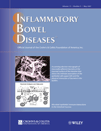Anti-flagellin (CBir1) phenotypic and genetic Crohn's disease associations
Abstract
Background: Antibody reactivity to microbial antigens correlates with distinct Crohn's disease (CD) phenotypes such as fistulizing or fibrostenosing disease. We examined the association between anti-CBir1 and clinical phenotypes and NOD2 variants in a large cohort of adult CD patients.
Methods: Sera and genomic DNA were collected from 731 patients with CD and tested for immune responses to I2, CBir1, oligomannan, and outer membrane porin C (OmpC) and the 3 most common CD-associated NOD2 variants.
Results: Anti-CBir1 reactivity was significantly associated with fibrostenosis (FS), internal penetrating (IP) disease phenotypes, small bowel (SB) involvement, and SB surgery but negatively associated with ulcerative colitis (UC)-like CD. Multivariate logistic regression analysis showed that anti-CBir1 was independently associated with FS and UC-like CD irrespective of the antibody reactivity to I2, oligomannan, or OmpC, but not with SB involvement or SB surgery. The magnitude of anti-CBir1 reactivity, when added to the quantitative response toward the other 3 CD-associated antigens, enhances the discrimination of FS, IP, UC-like CD, and SB involvement, but not SB surgery. Finally, although the frequency of anti-CBir1 was similar in patients with none versus at least 1 NOD2 variant, the quantitative response to CBir1 flagellin was significantly higher in patients with CD carrying at least 1 NOD2 variant versus those carrying no variants (median anti-CBir1 titer 33.39 versus 28.36, respectively; P = 0.01).
Conclusions: Anti-CBir1 serum reactivity in CD patients is independently associated with FS and complicated SB CD. Quantitative, but not qualitative, response to CBir1 is also significantly associated with the CD-associated NOD2 variants.
(Inflamm Bowel Dis 2007)




